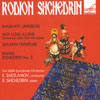Shchedrin Naughty Limericks; Not Love Alone suite; Piano Concerto No.2
The many faces of Rodion Shchedrin: ceremonial, modernist and cheeky
View record and artist detailsRecord and Artist Details
Composer or Director: Rodion Konstantinovich Shchedrin
Genre:
Orchestral
Label: Melodiya
Magazine Review Date: 7/2010
Media Format: CD or Download
Media Runtime: 0
Mastering:
Stereo
Catalogue Number: MELCD1001623

Tracks:
| Composition | Artist Credit |
|---|---|
| Concerto for Orchestra No. 1, 'Naughty Limericks' |
Rodion Konstantinovich Shchedrin, Composer
Evgeni Svetlanov, Conductor Rodion Konstantinovich Shchedrin, Composer USSR Symphony Orchestra |
| Not Love Alone |
Rodion Konstantinovich Shchedrin, Composer
Evgeni Svetlanov, Conductor Rodion Konstantinovich Shchedrin, Composer USSR Symphony Orchestra |
| Solemn Overture |
Rodion Konstantinovich Shchedrin, Composer
Evgeni Svetlanov, Conductor Rodion Konstantinovich Shchedrin, Composer USSR Symphony Orchestra |
| Concerto for Piano and Orchestra No. 2 |
Rodion Konstantinovich Shchedrin, Composer
Evgeni Svetlanov, Conductor Rodion Konstantinovich Shchedrin, Composer Rodion Shchedrin, Piano USSR Symphony Orchestra |
Author: David Gutman
The Solemn Overture (1982), a brazen ceremonial in the Tchaikovsky tradition, its aspiring sequences briefly subverted by ethnic drumming, is the kind of patriotic display piece Svetlanov adored and we aren’t supposed to. Other pieces are more adventurous. We kick off with Shchedrin’s familiar crowd-pleaser, the impish Concerto for Orchestra No 1 (1963) variously translated as “Merry Ditties” or, as here, “Naughty Limericks”. Leonard Bernstein took it up and Mikhail Pletnev has since provided probably the crispest recording this music will ever receive (DG, 9/01). That said, Svetlanov conveys its antic spirit with gusto and the spotlit sonics are rather fun. The near-contemporaneous suite from the opera Not Love Alone can seem somewhat pale after this, for all the affection lavished upon it: clarinet solos are eloquent, the buzzsaw brass an acquired taste.
The concert relay of the Second Piano Concerto (1966) could scarcely be more authentic. A frankly experimental efflorescence from the heyday of the composer’s semi-sanctioned modernism, its disruptive switches from updated Prokofiev to groovy jazz to all-purpose avant-gardism still bring one up short. “Contrasts”, the third movement, takes in single notes and chords from the pianist as if he were tuning the instrument and ends with a thunderous orchestral battering. Whatever the score’s ultimate substance, its sheer energy is difficult to resist. That Marc-André Hamelin’s modern alternative, makeweight for an otherwise all-Shostakovich programme (Hyperion, 1/04), feels more sophisticated is not necessarily a good thing in music that is provocative (even tacky?) by design. Or is it just a bag of tricks that has passed its sell-by-date? Over to you.
Discover the world's largest classical music catalogue with Presto Music.

Gramophone Digital Club
- Digital Edition
- Digital Archive
- Reviews Database
- Full website access
From £8.75 / month
Subscribe
Gramophone Full Club
- Print Edition
- Digital Edition
- Digital Archive
- Reviews Database
- Full website access
From £11.00 / month
Subscribe
If you are a library, university or other organisation that would be interested in an institutional subscription to Gramophone please click here for further information.




